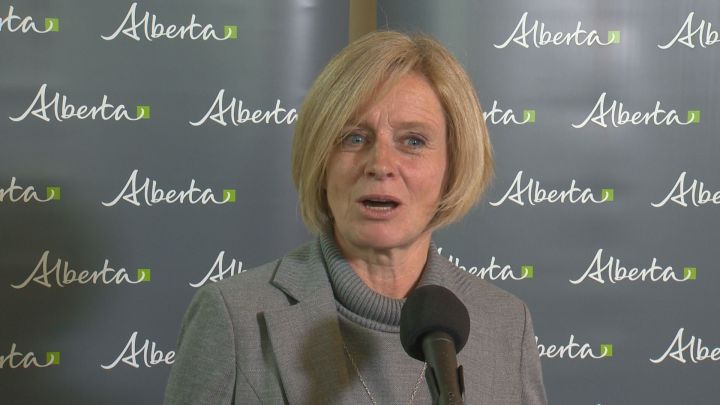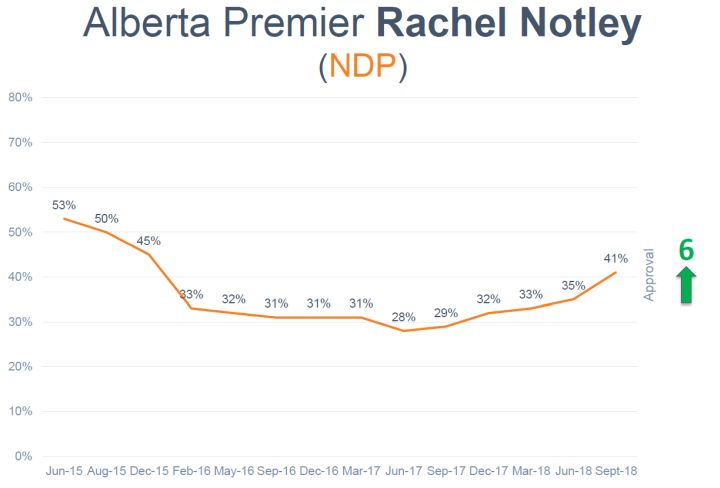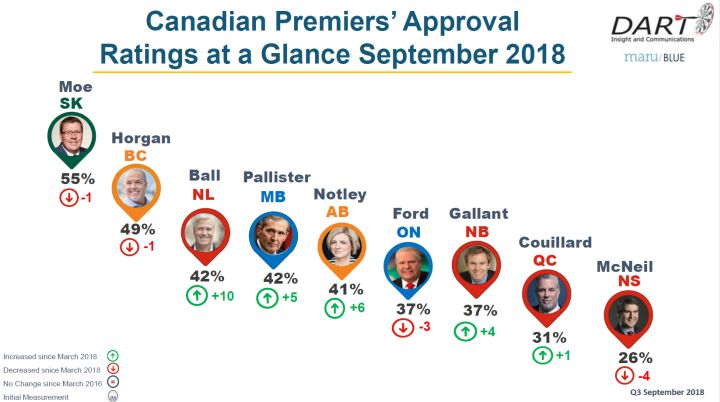As Premier Rachel Notley’s tough talk ramped up in response to the latest setbacks to Alberta getting oilsands bitumen to tidewater, it appears the NDP premier’s approval ratings are ramping up in kind.

Notley’s approval rating from Albertans rose an impressive six percentage points to 41 per cent between June and September, according to Dart Insight and Communications’ latest quarterly survey looking at the approval ratings of Canadian premiers.
READ MORE: Notley says Alberta will ‘hold Ottawa’s feet to the fire’ on Trans Mountain timeline
Watch below: Alberta will “hold Ottawa’s feet to the fire” on its 22-week Trans Mountain pipeline review timeline, so that there is a clear, consistent path forward, Premier Notley said on Sept. 21, 2018.

Speaking to reporters on Wednesday, Notley suggested she wasn’t focused on her polling numbers and said she is keeping her attention on fulfilling her party’s promises to Albertans, including to create jobs and protect public services.

Get daily National news
“We are just going to keep doing that and I will get a little more focused on the polls when we get into election season, which isn’t actually now,” she said.
“As I always say with respect to polls, when we ran for office in 2015, we laid out a plan and a commitment to the people of Alberta in terms of what we could do as government and my focus is staying true to that and delivering what we can to the people of Alberta… to have Albertans’ backs as we move through the recovery — creating jobs, supporting important public services and doing everything we can to make life more affordable – so we are just going to keep doing that.”
According to Dart Insight’s polls, Notley’s approval ratings were at an all-time high in June 2015, shortly after she and the NDP won a majority in the provincial election, ousting the Progressive Conservatives’ who had ruled Alberta for decades. Her ratings then began to decline, bottoming out at 28 per cent in June 2017. They have been trending upwards ever since, however, this latest quarter marks the Notley’s sharpest rise in approval ratings in a three-month interval since she became premier.
B.C. Premier John Horgan, who has not seen eye to eye with Notley on the Trans Mountain pipeline issue, saw his approval ratings drop by one per cent between June and September. However, his approval rating is eight points higher than Notley, at 49 per cent.
READ MORE: Escalating Kinder Morgan dispute prompts Trudeau to call joint meeting with Notley, Horgan
Dwight Ball of Newfoundland was the premier whose ratings jumped the most over the past three months — his numbers shot up by 10 points for an approval rating of 42 per cent. The premier with the highest approval rating in Canada is Scott Moe in Saskatchewan at 55 per cent. The approval ratings for the premiers of Prince Edward Island and the Canadian territories were not part of the analysis because of “extremely small sample size.”
METHODOLOGY: These are some of the topline findings of a Dart Insight poll conducted as part of a regular quarterly sounding of Canadians on various issues and matters that affect their lives as citizens, consumers and voters. The research is created and analyzed under the direction of veteran pollster John Wright, CEO of Dart Insight, which is a division of Dart Insight and Communications Inc.in partnership with Canada’s national survey sample research provider — Maru/Blue — that curates a vast online panel and provides data collection services. The survey was conducted among 5,769 randomly selected Canadian adults who are members of Maru/Blue’s online panel between Sept. 13-19, 2018. Respondents could opt in for either official language. The results have been weighted by education, age, gender and region to match the population, according to census data. This is to ensure the sample is representative of the entire adult population of Canada. Discrepancies in or between totals are due to rounding. The precision of this Dart Insight online poll is measured using a Bayesian Credibility Interval. In this case, the poll is accurate to within +/ -1.5 percentage points, 19 times out of 20, had all Canadian adults been polled. The credibility interval will be wider among subsets of the population and individual provinces. Minor discrepancies in the data may occur due to rounding.










Comments
Want to discuss? Please read our Commenting Policy first.